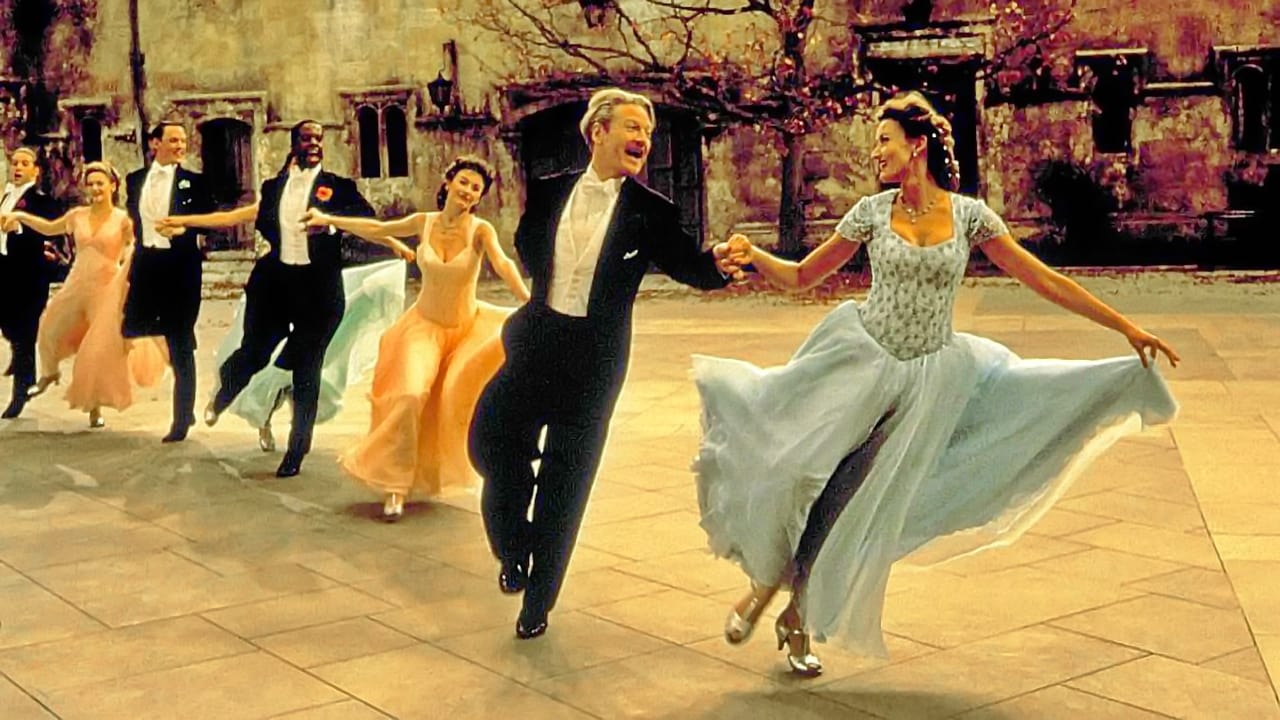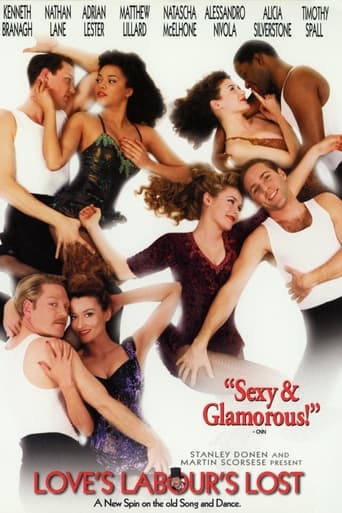

Really Surprised!
... View MoreFantastic!
... View MoreThe film creates a perfect balance between action and depth of basic needs, in the midst of an infertile atmosphere.
... View MoreAll of these films share one commonality, that being a kind of emotional center that humanizes a cast of monsters.
... View MoreSurprisingly light on substance.A Kenneth Branagh written-and-directed adaptation of the Shakespeare play. Set in WW2 for the movie, The King of Navarre and his three best friends have sworn off wine, women and song for three years, in the interests of studying. But then the beautiful princess of France, and her equally-lovely ladies-in-waiting arrive, and their oaths are quickly and sorely tested...Fun and funny at times but ultimately quite empty. It is short to begin with - about 85 minutes. Then you have the fact that this version is a musical and the amount of actual movie time is even shorter. In the end it just seems so full of empty schmaltz, fluff and padding. Reasonably moving ending though.On the subject of the music, I generally dislike musicals but the choice of music here is pretty good: George Gershwin, Cole Porter, Kern and Hammerstein, Irving Berlin. While I would still have preferred no musical numbers - it just wrecks any plausibility and continuity - it could have been a lot worse.Decent cast - Branagh, Alicia Silverstone, Alessandro Nivola, Natascha McElhone, Emily Mortimer, Nathan Lane, Timothy Spall - who put in solid performances. Don't know what Matthew Lillard is doing there though (note that I didn't include him in the "decent cast" list). He is conspicuous by his lack of acting skills and should stick to C-grade frat farces.
... View MoreKenneth Branagh is attempting yet another Shakespeare play. This time he's adapting it as a 1930 era musical. The King of Navarre and his three companions swear a very public oath to study together and to renounce women for three years. Their honor is immediately put to the test by the arrival of the Princess of France and her three lovely companions. This one stars Alessandro Nivola, Alicia Silverstone, Natascha McElhone, Matthew Lillard, Emily Mortimer among others.I'm fine with a musical. It's not my favorite genre but I won't hold it against this movie. However, everybody is playing it so broad. At times, they act like it's a parody of a 30s musical. It was ridiculously annoying. The second problem I had was the story. Here we have a story about powerful kings and princess. But it takes place in 1930s when royalty have only nominal powers. It makes no sense. Again it's really annoying. The stagecraft is good but there's no way I can recommend this to anybody other than musical lovers.
... View MoreI love Shakespeare and musicals, and I have a great respect for Kenneth Branagh. Love's Labour's Lost was not as bad as I'd heard, but I can actually understand the criticisms as while it does have its charms it is a heavily flawed film. The play is one of Shakespeare's weakest due to how overly-wordy it is, so I knew that when I heard about this film that it can go either way. I will start off by saying that Branagh does deserve credit for trying to make Shakespeare's work accessible to wider audiences, but it uncharacteristically came in mixed results here. I often praise Branagh for his respect and understanding for Shakespeare, but his other films especially Much Ado Nothing, Hamlet and Henry V did this much better. Other than the title and some of the dialogue, which is not the most poetic and witty Shakespeare has done but has evidence of both, there's not really enough that of that Shakespeare feel. That is largely because while making a noble attempt to make the play accessible Branagh oversimplifies the writing and consequently loses the story's consequently making it here thin and too much of an excuse to string song-and-dance numbers one or another.Another consequence is that as a directing job it is on the unimaginative side and feels like too much West End not enough Branagh. There are also two miscasts. Matthew Lillard is a tall, handsome and likable guy, but here he constantly sounds and looks like he's got something up his nose. Even more problematic is Alicia Silverstone, who I liked in Clueless, but I thought she was pretty awful here both as a singer-dancer and as a Shakespearean actor, she can barely sing a note without being breathy and out of tune and is often behind the beat in the singing, and in terms of acting her delivery is always forced and awkward especially in the darker shift of tone. Finally, I usually like Timothy Spall a lot but his I Get a Kick Out of You was for me an embarrassment.On the plus side, the 30s setting is evoked absolutely beautifully, and it is well filmed too. The songs from the likes of Cole Porter, George Gershwin, Irving Berlin are outstanding, and the dancing sequences in the film do have a lot of charm and pizazz, especially Let's Face the Music and Dance, There's No Business Like Show Business and They Can't Take That Away from Me. Even though the singing is not exactly great, it isn't entirely awful, the best voice of the entire cast easily comes from Carmen Ejogo. The characters are not that developed, due to the oversimplifications but do have a lot of easy-going charm and likability that I can't hate them. Some members of the cast, namely Branagh, Richard Briers and Geraldine McEwan do show an understanding of Shakespeare, how it should sound and feel. I did like most of the performances. Branagh is not entirely convincing age-wise but is enthusiastic at least in his role. Briers and McEwan are splendid, while Nathan Lane is hilarious. I especially loved Natascha McElhone and Adrian Lester. McElhone plays her role with such beauty and depth, and Lester is sublime in his equally sublime musical set piece.All in all, has its charms but for me it is not one Branagh's finest hours. 6/10 Bethany Cox
... View MoreThere are many good moments in this movie, which by the way I like. Alica Silverstone gives a very performance - even in many scenes suggesting real majesty, Kenneth B is also good as might be expected. Nathon Lane is wonderful - especially in the musical numbers, which should be no surprise! He even makes something out of nothing with the poorly written comedy routines.But the rest of cast for me was very uneven. I did like and I thought was brilliant the use of news reels to add an extra depth to the action. And they were well chosen to boot. also the songs were like the great hits of American song writing. I wish the performances were as good.They were not. especially 'On the Way you Look Tonight" And "I've got you under my skin.' But the goodbye scene when nothing is resolved with them singing "They Can't take that away from Me" were truly moving and sad. The war scenes in black & white wee excellent and the end when they reunited was truly moving - especially the headline "Victory!" For its faults this is a film well worth seeing. Just don't expect it to be a typical film.
... View More